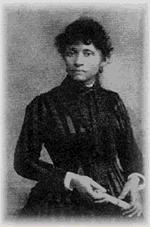

|
Lucy Parsons (1853-1942): A woman of color and a working-class revolutionary, Parsons spent her life struggling for the rights of the poor, unemployed, homeless, women, children, and minority groups, and for a future society based on free association of labor organizations. Born in Texas, possibly a slave, she met Albert Richard Parsons, a militant advocate of the rights of freed people, around 1870, and they moved to Chicago in 1873. In 1877 Albert was blacklisted from the printing trade, and Lucy assumed household financial responsibility by opening a dress shop. She began writing about tramps, disabled veterans of the Civil War, and working women for the Socialist in 1878. She soon gave birth to two children. She joined the anarchistic International Working People's Association in 1883 and the Knights of Labor the following year. In 1884 the IWPA began to publish the weekly Alarm in Chicago, with Albert as editor and Lucy a frequent contributor. Her most famous piece was "To Tramps," which advocated propaganda "by the deed" against the rich. On April 28, 1885, she and Lizzie Holmes headed the anarchists' march on the new Board of Trade; on Thanksgiving of that year, Lucy Parsons led the poor people's march down Prairie Avenue, ringing the bells at the homes of the rich. With other anarchists, she began organizing for the May 1, 1886, general strike for the eight-hour day, concentrating her efforts on sewing women. On May 1, she and Albert led 80,000 workers and supporters up Michigan Avenue. Three days later a labor rally at the Haymarket was the occasion of a fatal bombing incident. Police charged that radical activists were responsible. As her comrades were rounded up after the May 4 bombing, Lucy began organizing the Haymarket defense. After eight defendants, including Albert, were found guilty of murder, she traveled to many states, pleading her comrades' innocence to the charges, but defending their revolutionary goals. By February 1887, she had given forty-three speeches in seventeen states. When Albert was executed in November of that year, Lucy became a widow with a cause to carry on. Publisher of the short-lived paper Freedom (1892), which attacked the racist lynchings and peonage of blacks, and a member of Eugene Debs's Social Democracy, she was also a founding member of the Industrial Workers of the World and publisher of the Liberator (1905-6), to which she contributed a series on famous women. In her role as traveling orator, Parsons reemerged in public notoriety in a 1914 San Francisco demonstration of the homeless and at the head of a 1915 demonstration of the Chicago unemployed and homeless (Jane Addams paid her bail). She took up the cause of Tom Mooney and other imprisoned activists and in 1927 was elected to the national executive committee of the International Labor Defense, a CP front dedicated to defending political prisoners. After years of CP association ' she joined in 1939. In 1941, in one of her last public appearances, she addressed strikers at international Harvester, formerly McCormick Reaper, where the events leading up to Haymarket had begun. Lucy Parsons died in a fire in her home on March 7, 1942; her personal papers and books were seized by authorities from her gutted home. REFERENCES Ashbaugh, Carolyn. Lucy Parsons - American Revolutionary. Chicago: Charles H. Kerr, 1976. Source: |